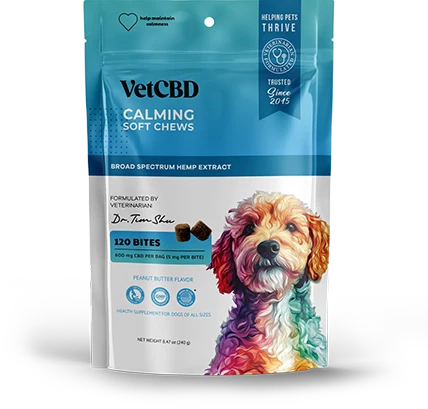
Occasional Inflammation Support for Dogs: What's the Safest Option?
Share
When our dogs are uncomfortable, our hearts break. It’s hard to see a dog that is in discomfort, no matter what the cause. Dogs are usually troopers in terms of keeping their heads high and dealing with discomfort, so when you see your dog suffering, it’s highly likely their discomfort has probably reached a fevered pitch. If you suspect your dog is suffering, you can look for some signs:
- Limping or favoring a paw or leg
- Refusal to play, eat or move around
- Lethargy or sleeping more often than normal
- Whining or crying
What Are NSAIDS?
Nonsteroidal anti-inflammatory drugs, or “NSAIDs”, are medications that reduce inflammation and are prescribed for both people and animals, however, it is of extreme importance to note that the same NSAIDs prescribed to humans are not safe for dogs. This is why it is crucial for you to speak to your dog’s veterinarian to make sure that if your dog is in need of an NSAID discomfort reliever, they are given one that is veterinary grade and safe for their ingestion. NSAIDs work by reducing the amount of inflammation in your dog’s body and thereby alleviating discomfort that is associated with that inflammation. NSAIDs may be prescribed to your dog after an operation, after an accident, or to help them with chronic discomfort from underlying conditions. While these medications can sometimes be essential and necessary, it’s important to ensure you are only giving them to your dog as prescribed and as necessary to avoid as many side effects as possible.Possible Side Effects of NSAIDS for Dogs
Your dog’s veterinarian will likely not want to keep her on NSAID discomfort relievers for extended periods of time. This is because, just like with humans, these medications can have side effects that aren’t good for us. NSAIDs are powerful discomfort relievers that are best used only when absolutely necessary and only when prescribed by your dog’s veterinarian. Some of the most common side effects of NSAID usage are:- Gastrointestinal discomfort. Dogs who don’t tolerate NSAIDs well may experience nausea, vomiting, and diarrhea when these types of drugs are administered. If this happens, discontinue use and speak with her veterinarian right away. There may be a different medication that would work better for her.
- Loss of appetite. Some dogs may experience a loss of appetite while taking NSAIDs. While this will likely dissipate, it’s important to notate any changes in your dog’s appetite and report them to her veterinarian if what she is experiencing falls outside of the range of appetite loss warned of by her vet or from the drug manufacturer.
- Lethargy, tiredness. Your dog may become weak, tired, or nap more while taking NSAID discomfort relievers. While this can be normal, a dog that needs daily medication may need something different if the medication she is on makes her perpetually drowsy.
- Kidney and liver issues. Because NSAIDs are processed through your dog’s kidneys and liver, the chance for damage to these organs is higher if the medications are taken long term. As such, many pet owners whose dogs need long-term medication must be extremely careful in discussing long term medication use with their dog’s veterinarian so as to ensure their pet’s overall health.
Natural Ways to Support Our Dogs
Thankfully, there are supplements we can give our dogs to help support their overall joint and cartilage health, support and maintain their current level of mobility, and soothe sore muscles and aging bones. Holistic, all-natural supplements can support your dog’s musculoskeletal system and help them feel better and move better. Some of the most popular supplements for bone and cartilage health are:- Turmeric. Popular for use in humans as well as animals, turmeric has long been praised for its ability to provide temporary soothing to muscles and joints that are overworked from everyday activity or particularly strenuous exercise. Turmeric is full of antioxidants which can also help support your dog’s immune system and maintain their overall health and wellness.
- Capsicum. This is an extract from the chili pepper, and this spicy little supplement is thought to help increase circulation to your dog’s connective tissues and joints, and support their body’s own innate immune response.
- Glucosamine. This is a naturally occurring compound found in cartilage that can be harvested from shellfish and given to your dog in supplement form. This supplement supports cartilage health and keeps it strong!


